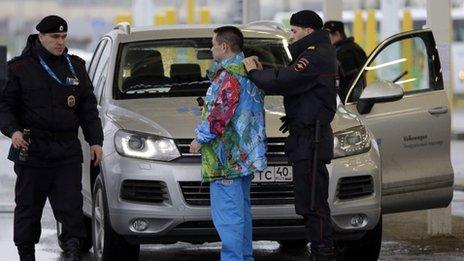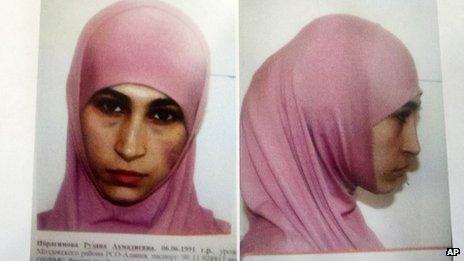Sochi Olympics: How safe are the Games?
- Published

Police and security guards are already a familiar sight around the Sochi Olympic park
UK government officials are warning that more terrorist attacks in Russia are "very likely to occur" in the run-up to, or during, next week's Winter Olympics in Sochi, where 88 countries will be competing.
A twin bomb attack in the Russian city of Volgograd in December killed 34 people. It was claimed by a militant Islamist group based in Dagestan, in the North Caucasus.
An assessment of the threat seen by the BBC names a Caucasus group, Imarat Kavkaz (IK), as posing the main danger to the games on the Black Sea coast, saying it has repeatedly expressed a desire to target them.
It points out that in July 2013 the group's fugitive leader, Emir Doku Umarov, called on his followers to do what they could to disrupt the games.
'Black widows'
But the assessment questions whether the group has the capability to target such a specific event within a narrow time frame. The Winter Olympics are scheduled to run on 7-23 February.

Suspected female suicide bomber Ruzana Ibragimova may already be in Sochi
The British assessment is that Sochi would be far harder for terrorists to attack than Volgograd, due to Russian military operations, with Moscow pouring in more than 37,000 extra troops and police and imposing a "ring of steel" around the Olympic venue, largely closing it off from public access.
Dressed all in black, the security guards are already a familiar sight around the Olympic park.
The authorities have also been hunting a suspected female suicide bomber named as Ruzana Ibragimova, the 22-year old widow of a militant, who - it is feared - could already be in Sochi.
There are concerns, too, there could be up to three other female suicide bombers at large, known as "black widows" since they were reportedly married to slain insurgents.
The British document points out that IK has no track record of attacking non-Russian interests - its fight is with Russia rather than with the West.
The document said there was a possible threat, though less likely, from Russian jihadists returning from Syria.
Earlier this month, five countries' national Olympic committees received letters threatening terrorist attacks - but officials have dismissed these as a hoax.
But the US is taking security seriously, posting two of its warships offshore in the Black Sea, offering "unspecified air assets", deploying FBI agents and sharing counter-terrorism intelligence with Russia.
- Published21 January 2014
- Published18 January 2014
- Published31 December 2013